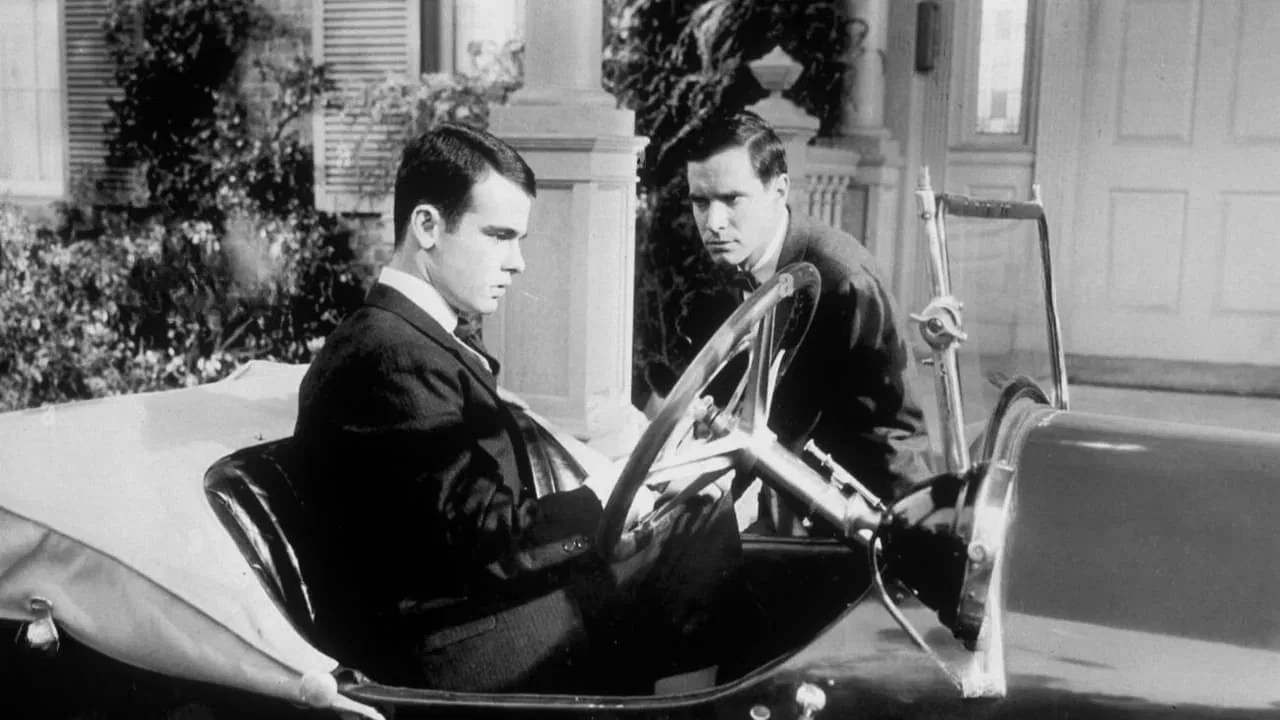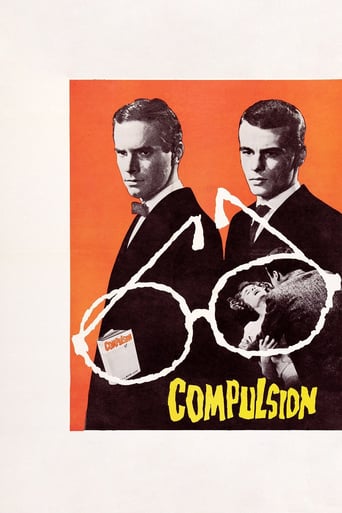ada
the leading man is my tpye
GamerTab
That was an excellent one.
Mischa Redfern
I didn’t really have many expectations going into the movie (good or bad), but I actually really enjoyed it. I really liked the characters and the banter between them.
Phillipa
Strong acting helps the film overcome an uncertain premise and create characters that hold our attention absolutely.
Leofwine_draca
COMPULSION is a very well cast courtroom drama from 1959, featuring a trio of actors all giving very strong performances. The story is based on the same real-life murder case as Hitchcock's ROPE, about a pair of college students who killed a youth and then attempted to cover up their crime. This film goes for the psychological approach and is rather slow moving and dated, although the authentic performances go some way to making it watchable. A near-unrecognisable Orson Welles shows up late on as a lawyer, but the real stars are the youthful team of Dean Stockwell and Bradford Dillman, both completely believable.
disinterested_spectator
There are a lot of movies featuring a character who is an atheist, but movies in which the atheist is a follower of Friedrich Nietzsche are in a special category. Most such movies are based on the Loeb and Leopold murder, which shocked the nation in 1924. Two men in their late teens, geniuses who had already graduated from college and who came from wealthy families, committed a coldblooded murder of a fourteen-year-old boy. Richard Loeb was primarily interested in committing the perfect crime; Nathan Leopold wanted to prove that they were Nietzschean supermen, whose superior intellect freed them from the moral restraints that ordinary men were expected to adhere to. Now, most scholars would agree that Nietzsche would never have sanctioned such a coldblooded murder, but the fact that some people, like Loeb and Leopold, interpret Nietzsche that way is undeniable.Occasionally, a movie will not refer to Nietzsche directly, but his influence is implied, as in the movie "Strange Cargo" (1945), where the villain is referred to as "superman." And in the movie "The Fountainhead" (1949), one almost gets the sense that each of the major characters feels compelled to announce which version of Nietzsche's philosophy of the will to power he or she represents. But mostly, movies with Nietzschean atheists are based on the Loeb and Leopold case. And of those, the best of the lot is "Compulsion."The names were changed to allow some latitude for the sake of storytelling. Richard Loeb is Arthur "Artie" Straus (Bradford Dillman); Nathan Leopold is Judd Steiner (Dean Stockwell); and Clarence Darrow, the famous lawyer who defended them, is Jonathan Wilk (Orson Welles).One of the great ironies of the story is the way these two geniuses planned their perfect murder for seven months, and yet they made one stupid mistake after another. One of the most damning pieces of evidence was Judd's glasses, which he accidentally dropped where they disposed of the boy's body. It had a special hinge that only three people in the area had purchased, and the other two were easily eliminated as suspects. After Artie and Judd have finally confessed to their crime, Wilk is hired as their lawyer, with much reluctance on the part of their parents, however, because he is an "atheist." Actually, the real Clarence Darrow considered himself an agnostic, as does Wilk in the movie, but one suspects that people who did not like Clarence Darrow preferred the more pejorative term "atheist," refusing to mince words on the subject.Artie and Judd never characterize themselves as either agnostic or atheist, but it would be hard to believe that they were anything but atheists, given their admiration of Nietzsche and their willingness to commit a horrible murder just to prove that they were superior. Regardless of what the final words actually were between Darrow, on the one hand, and Loeb and Leopold, on the other, it was still necessary in 1959 for movie agnostics and atheists to make amends: the agnostic, by indicating that he still regards the existence of God as a genuine possibility; the atheist, by recognizing that he has been wrong in thinking that God does not exist.We see both in the final scene. After the judge rules that Artie and Judd will not be executed for their crime, but will spend the rest of their lives in prison, which was the only outcome Wilk could reasonably hope for, the following dialogue takes place:Artie: "So we sweat through three months of misery just to hear that. I wish they'd have hung us right off the bat."Wilk: "I wasn't expecting you to fall down on your knees and thank God for deliverance."Judd: "God? That sounds rather strange coming from you, Mr. Wilk."Wilk: "A lifetime of doubt and questioning doesn't necessarily mean I've reached any final conclusions."Judd: "Well, I have, and God has nothing to do with it."Wilk: "Are you sure, Judd? In those years to come you might find yourself asking, if it wasn't the hand of God dropped those glasses. And if he didn't, who did?"To that question, Judd hesitates, and then has a look of fear and bewilderment.Now, it is hard to take the suggestion that it was the hand of God who dropped Judd's glasses. I mean, as long as God was going to get involved, why didn't he prevent the little boy from being murdered in the first place? But some people would say that that way of thinking is typical of an atheist like me, who just doesn't understand that God works in mysterious ways. So, even if I think Wilk's suggestion is absurd, most people watching this movie in 1959 would have found it perfectly reasonable.Alternatively, one might go all Freudian and say that Judd had an unconscious desire to be caught. That would seem to be the significance of the last question, "And if he didn't, who did?"Personally, I think it was just an accident. We don't need God or Freud to explain that. But the main thing is that for those in the audience who needed to see the atheist realize that there might actually be a God, Wilk's first hypothesis about the hand of God dropping the glasses would have been the preferred interpretation.
writers_reign
Even now, some ninety-plus years after the event there is, it would seem, still some mileage left in the infamous Leopold/Loeb case that has already spawned at least two novels, a stage play and several movies. The facts can be stated in a brief sentence; two wealthy Chicagoans, late teens, Jewish, gay, highly intelligent and disciples of German nihilist philosopher Frederich Nietchze, planned and carried out the cold-blooded murder of a young boy in order to see how it 'felt' to kill. They were caught, stood trial, and were defended by Clarence Darrow, a lawyer who never prosecuted a case but always appeared for the defense. Darrow pleaded the case before a single judge rather than a 12-man jury and by so doing was able to avoid the death penalty and secure life sentences for both defendants. All hands turn in solid work from Dean Stockwell and Bradford Dillman as the sociopaths, E.G. Marshall as the State prosecutor and above all Orson Welles who dominates the last hour as Jonathan Wilk, a lightly fictionalised Clarence Darrow. Richard Fleisher wisely shot in black and white which adds atmosphere. Still more than watchable.
krocheav
As a result of his handling of this film, Director Richard Fleischer either inherited a reputation for his skill at telling stories about flawed murderous characters or he was attracted to the subject (The Boston Strangler" in '68 ~ "Ten Rillington Place" in '71) Whatever the driving forces he surely displayed a natural talent to examine, and chill, within the genre. What 'Compulsion' achieves is certainly compelling viewing.With its basis in shocking fact this movie works on several levels.Firstly: as a denouncement of certain teachings found within educational institutions on the writings of German post modernist philosopher Friedrich Nietzsche. In this instance by examining his theories that certain members of the human race are, by benefit of their advanced knowledge, and superior intellect, above the law of the 'common' people. He regarded these as the 'Superhumans'. Its even possible this philosophy and his 'will to power' could arguably be attributed to the actions of certain members of the ruling class, perhaps even forming part of the disastrous 'causes' of World War 1, etc (as a contributing force behind the philosophical reasonings of the day)The characters that form the homosexual duo of this shocking case are representational of the 'Crime of the Century' murderers: Leopold and Loeb. Both sentenced to Life + 99 years for the senseless killing of 14yr old Bobby Francis (2nd cousin of Loeb). Their reason for the murder? the thrill of performing the 'perfect' murder based on the repugnant belief of their own 'superior' Nietzscheian intellect! Secondly: as an argument against capital punishment. The parents of Loeb commissioned the services of renowned criminal attorney Clarence Darrow (Orson Wells) who was championing the case against the death penalty. His brilliant courtroom speech is regarded by some as one of the most important turning points in redemptive sentencing. This humanitarian reverse reasoning has proved beneficial in several cases, but how does it hold up within the framework of this modern era? Some contemporary viewers might bring into question the growing number of people who fall victims to murderous criminals - following their re-release into society as being 'CURED' - Sadly this number would appear to be larger each year. When this is considered, along with the rapidly growing number of serial murderers now held in 'corrective' services, it invites the question...if proved guilty beyond doubt, and never to be released, is this then worthy of the very large resources involved?. Difficult situation. The performance of Dean Stockwell (as the Leopold character) is quite astounding, as are all the superb players in this stark drama. Somewhere along the way it would seem some character details, either within the screenplay or the novel, have perhaps been transposed differently from the claims of the real participants and various reports ~ but this tends to occur with many transcriptions of factual events. Oscar winning veteran director of photography: William C. Mellor: earlier known for the good looking "Reaching for the Sun" '41 ~ "Bad Day at Black Rock" '55 ~ "Giant" '56, captures all the tension in striking B/W CinemaScope. Boston born screenplay writer Richard Murphy in the same year adapted Paul Muni's final movie: "The Last Angry Man" for the screen and is also known for, "Les Miserables" '54 ~ "Panic in the Streets" '50 ~ "Deep Waters" '48. His screenplay was based on the novel of the same name by Meyer Levin, writer and producer of "My Father's House" in '47. Director Fleischer a few years later would give us "Barabbas" '61 and "The New Centurions" '72. He begun in the early 40's working on fast paced RKO supports like the acclaimed "Narrow Margin" '52.My brother in law made me a present of a superbly re-mastered DVD, so for those interested in thought provoking stories based on factual crimes, this comes recommended. KenR

